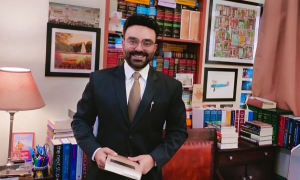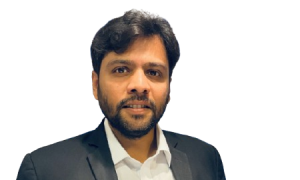KAVITA JITANI, CO-FOUNDER AT BONDHU, ON WORKING AS A LAWYER AND HER DECADE LONG PROFESSIONAL EXPERIENCE IN THE LEGAL SECTOR

This interview has been published by Maaz Akhtar Hashmi and The SuperLawyer Team. The Interview was taken by Priyanka Cholera.
While pursuing your graduation from NLIU, Bhopal, you interned with several corporate law firms, including Dua Associates, Singhania and Co LLP etc. Can you tell our readers about your time at law school and foundational years?
I had my initial schooling in my home state of Assam. I have been blessed with amazing and supportive teachers throughout my life. They have had a profound impact on me. One of the early lessons I learnt was – there’s no substitute for hard work. And that always push your limits, when working on your goals. Following on this, in law school (both at undergraduate and master’s level), I strived to participate in every event and do all that I could.
I pursued a 5-year B.A, LL. B course from BMS College of Law, Bengaluru between 2003 and 2008. My college had some of the best teachers I have come across. They ensured our basics are strong. At college, I served as cultural secretary for four years and organised events of all sorts; participated in moots and co-curricular activities like debates inside and outside the college; wrote; and was amongst the top students of the class. Simultaneously with the LLB course, I successfully completed a one-year programme on Intellectual Property Rights Law from National Law School of India University, Bengaluru (NLSIU). During this time, I discovered what a treasure the NLSIU’s library was. From then on, I was at the NLSIU library atleast two days every week. From seventh semester, I interned with a litigation firm for about 8 months to learn more about how the law works on the ground. I would work at their offices after college hours till late in the night. In my tenth semester, I decided to pursue a master degree in law. In law school, I was lucky to make some good friends for life.
At National Law Institute University, Bhopal (NLIU) too, I was amongst the top students of my LL.M (Business Laws) batch, served as Secretary of an active cell called Centre for Business and Corporate Laws, served the LL.M placement committee for most part of the 2-year course, organised conferences including an international conference, participated in events and wrote papers. I also pursued a few certificate courses on the side. During vacations, I would intern with law firms in the metros.
At home, we generally lead a sheltered life, all our needs are taken care of. It is only when you step out to live alone you realise what a blessing your parents and family are. In Bengaluru, I chose to share a house with friends. There I had to manage my house and related paraphernalia, but I could also set my own timetable, travel around the city and could have interests and friends outside college. At NLIU, I pursued a residential course. The two lives were pretty distinct. At NLIU, I could devote more time to academics. Because the university was some distance away from Bhopal city, having interests outside the college or visiting the city were a challenge. Both lives taught me a lot. One common lesson I learnt was – your goals should matter more than your distractions. We live far away from our families. This itself is a huge sacrifice not just for us but for our families too. We need to make every day count.
Post your graduation, you joined M/s Corporate Lexport as a Junior Associate. Could you summarize your company journey and tell us some of the essential values your first job instilled in you?
I had joined Lexport after an internship with them, so I was familiar with the culture and people there. Even though I had joined the firm as a corporate associate, the firm’s founder and managing partner Mr. Srinivas Kotni gave me litigation work too, given my interest. He was always eager for new and challenging work. We probably drafted the first application in India under the prepaid payment instruments’ regulations. We studied what other jurisdictions were dealing with similar instruments, tried understanding the technology these instruments were using and generally did everything in our power to best serve our client. It was a great experience. I also drafted an SLP for an indirect tax matter within the first 6 months of joining. Professionally, my journey with the firm was enriching.
The first year and the first job for most professionals entails a steep learning curve. Mine was no different. I would say many of the lessons I learnt till then have held me in good stead even now. For example – one needs to be a lifelong learner if one wants serve their clients and the profession well. If we do the small things well, bigger things would come to us. We all make mistakes but how open we are to rectify our mistakes is the key. These days, people do not accept their mistakes. It is important that we do. It is also equally important to not beat ourselves with it, instead find a solution. A good leader and boss would also value associates who accept their mistakes and bring a viable solution on the table.
Post your time at Corporate Lexport, you went on to work as a consultant in OSC Services and simultaneously joined as a guest faculty with the business law course at IMT Ghaziabad. What prompted the shift towards the academic side, and what was your mantra as a teacher while coaching students?
I have always loved teaching. One of the reasons for pursuing an LL.M was to be able to teach. Also, in most jurisdictions, especially the western ones, you would find the best lawyers spending a part of their time in academia. In India too, you can find some of our best lawyers teaching as guest faculty in various institutions.
I have always felt that to be good at the legal profession, one needs to invest time in academia too. Also, it is important to share what we have learnt with the next generation. This is how human civilization has progressed. At IMT Ghaziabad, I taught two courses – Business Laws and Economics. More than the students, I would say I have learnt from them. After IMT also, I have had the opportunity to share my knowledge with students. My mantra while teaching has been to make the classes interactive and interesting.
You joined the Competition Commission of India (CCI) as an expert, part of the combinations team. You also drafted policy documents while working at CCI. Could you tell us some policies you were passionate about and what changes you feel are necessary when evaluating companies entering into combinations?
When I had joined CCI in 2013, combination regulations were still at a nascent stage. The substantive sections on combination regulation, i.e., sections 5 and 6 of the Competition Act, 2002 were notified in June 2011. The principal subordinate legislation on combination regulation – The Competition Commission of India (Procedure in regard to the transaction of business relating to combinations) Regulations, 2011 – was notified in May 2011. So, there was a lot that could be done. I was pretty excited about the opportunity, after all how often do fairly newbie lawyers get a chance to create jurisprudence.
At CCI, I had the opportunity to work with an amazing team. I particularly learned a lot from Mr. Kapil Aggarwal, Mr. Shyamal Misra and Ms. Archana Goel Gulati. We wrote papers on various topics including non-compete. We also introduced the concept of material influence within the meaning of control. In terms of procedure and practice, we for the first time collaborated with another jurisdiction on a matter. We also called for information from third parties in Phase I when we found the information furnished by parties to be inadequate. Inter alia, we created internal procedures for Phase II cases, given they are time sensitive.
For a law to attain its purpose, it is imperative that the law is enforced and the defaulter penalised. Competition Law is a welfare legislation. In a free market economy, it is essential that there is a level playing field and that consumer interest is protected, this is where competition law comes in. For me therefore the most satisfying part was working on unreported transactions, where we successfully initiated penalty proceedings against the defaulting parties before the Commission. I am happy to share that the ratios laid down in our cases are still good law.
Having had an impressive stint at the CCI, you went on to become a legal consultant at Fedders Lloyd Corporation Ltd., where you handled all legal matters for the group. How was your role different as compared to in-house counsel?
I joined Fedders as head of their non-lit function. My role I would say was a mix of – rendering opinions (to the management of the group companies), negotiating agreements along with business heads with external parties and seeing to it that the legal advice the Group received and agreements it entered were worked on the ground. I was also entrusted to handle the group’s antitrust cases. So, I wouldn’t say my role was different from that of a typical in-house counsel. I understand that in-house counsels these days handle company affairs’ just as law firm lawyers do. These days, I feel in-house counsels need better business acumen and personality management skills.
Continuing your love for competition law, you joined CCI again as their resource person for Competition law advocacy, following which you joined Samvad Partners in their Competition law team. How would you advise a younger set of lawyers/law students who want to venture into the said niche?
Here, I would like to correct you. The role of Resource Person with CCI was concurrent with my role with Samvad. There was no conflict between the two roles.
Not as an advice but more as life learnings – please read not just Competition Law of India but also allied laws like Contracts and Companies Act. SEBI is an older regulator in India and I would say amongst the more successful ones too. SEBI’s discussion papers and orders can help you understand how an economic regulator ‘thinks’. Further, since Competition Act, 2002 is pretty new, one needs to regularly read about how the EU and the US are dealing with competition cases there. Also, because India is an OECD member state, ideally one should keep oneself abreast of OECD round tables and discussions.
You were a part of the Competition team at Samvad, where you came up the ranks from an Associate to a Senior Associate. Considering the attrition rate at Tier-1 law firms is so high, what would be your suggestions to young associates on surviving the pressure and climbing the ranks?
Actually, I was legal head of Fedders Lloyd group for its non-lit function. It may sound very cliché but to be honest so far in my life I haven’t really cared much about positions. Probably because of my family of entrepreneurs. I have always felt that a person makes the position rather than the other way round. In every walk of life, you would find that people who are good at what they do, command respect. In 2016, I had joined Samvad’s Mumbai office because of the work I could do there. Samvad’s Mumbai partner Ms. Vineetha MG is amongst the best lawyers I have worked with so far. Amazing work ethic, self-made and a good human being. I am glad I chose to work with her.
If I were to advise young lawyers, I would say – (a) Do your work to the best of your abilities. In the long run – your work is all that matters. (b) Network and collaborate. Look for shared goals rather than points of disagreement. (c) If you want to be successful, do not run after big names. Instead look for people you would be happy working with, people who you can learn from. If you find a toxic workplace, just run! Our profession is all our mental ability and strength. No amount of money can compensate for mental trauma.
Being head of Antitrust Compliance at Flipkart Internet Pvt. Ltd. What do you believe will be the significant competition concerns in the online world a few years from now, considering we have multiple businesses for the same area being introduced daily?
Worldwide, e-commerce is growing at a rapid pace. The pandemic has only quickened its pace. The digital economy, unlike the traditional economy, is largely managed by algorithms. With the growth and development of artificial intelligence, I would think human intervention in creating these algorithms would lessen as we go along the path. Regulators worldwide are already grappling with newer challenges posed by constituents of the digital economy – for example, in merger regulation, we are still debating how to value e-enterprises when their revenues are in the negative, and their assets, as we understand in the traditional sense, are way lesser when compared with a traditional business wielding as much market power. Given network effects, an e-commerce enterprise with a considerable subscriber base can fairly easily expand in other markets. E-commerce giants entering payments or established e-commerce enterprises venturing into music streaming and reading devices are cases on point. This benefit may not be as readily available to new enterprises. In India also, we have had a number of cases where the aggrieved parties found fault with actual/potential vertical integration of e-commerce players. Also, it is being argued that collusion in the digital space is easier than amongst traditional businesses. Among e-commerce players, finding or proving concerted action is difficult, mainly because not every competition regulator is equipped to deal with such issues in terms of technological knowhow. Also, many a times what may appear to be concerted action can just be innocent parallel behaviour arising out of algorithms. The other concern would be how to ensure a playing level field qua information or data of consumers. The privacy concerns per se hopefully would be taken care of by separate privacy legislations.
Few know that you have cleared the NET exam and are a Six Sigma Yellow belt holder and a Tax Return Preparer. How did you manage to do all this while being entangled with so much work? What would be your advice on managing work and also continue following the process of learning?
Like I said before, if one wants to serve their clients well, there is no escape from constant learning. I have always enjoyed and loved the profession of law. But in the humdrum of everyday life, many a times we lose focus of our life goals or why we took up the legal profession in the first place. I feel it is nice to reboot sometimes. Also, I feel we shouldn’t wait for retirement to do things we like apart from our profession. So, I consciously make an effort to take breaks of a month or longer every few years, just to explore life. For example, in 2012 I was on a two-month long sabbatical when I took up the Income Tax Department’s TRPS programme and appeared for UGC-NET. These breaks have helped me immensely not just to add to my academic credentials, but also to rejuvenate and reconnect with my roots.
From 2010, you have been associated with Xomidhan as a subject matter expert/counsellor for law, a not-for-profit organization providing career counselling to students of the North East. What advice do you instil in students generally for a successful career in law, and what would be your three most important lessons for any student to follow?
For your readers’ benefit, Xomidhan is a not-for-profit social enterprise which has been providing free career counselling online through a 300+ strong army of subject matter experts. Everyone at Xomidhan works pro bono. Given north-east suffers from information deficit, relatively speaking, we focus mainly on the north-east. Also, since most of us are from the north-east, it helps us to cater to the audience there better. Xomidhan has received multiple recognitions for its services.
At Xomidhan, there has been a massive change in the kind of questions we receive on law as a career stream. In 2010, for example, people would ask if a career in law could sustain them financially. Now the questions are mostly on which law stream they should choose or scope of dual specialisations. Our constant advice through this change has been – work hard, read and like what you do.
You have set up Bondhu, an EdTech social enterprise aiming to provide entrepreneurial opportunities to individuals of the northeast region of India. How this noble idea was conceived in the middle of a pandemic?
Before I answer your question, let me tell you something about myself. I come from a traditional Marwari business family of Upper Assam. I spent the first 10 years of my life in a sprawling joint family home in a small town of Assam called Naharkatia. During those days, connectivity to the outside world was limited. We had little to no cable television. Even newspapers would reach us two days after the date of publication (newspapers like Economic Times would reach us after a week). Our region would suffer from natural and man-made calamities often. Innovation was limited. Our natural resources mostly remained untapped. Apart from tea and timber, we weren’t exporting much outside the region. Even though Assam and the Northeast have changed for the better in the last two decades, the region is a long way away from attaining its full potential. Working with Xomidhan made me realise that our region needs entrepreneurship where home grown entrepreneurs find local solutions for local problems and take the region’s unique offerings to the world. For example, Himalayan turmeric grown in our region has double the amount of curcumin found in other varieties of turmeric. We have a wide variety of indigenous orchids. Most of the north-east is scenic. Bird treks, hills treks, nature walks, adventure sports and training have huge tourism potential. However, entrepreneurship is the last option for most from our region still. I always thought this needs to change but didn’t know how. Opportunity with NSRCEL, IIM-B last year gave a more concrete shape to it. Inter alia, I learnt how to do market research, find solutions, and design the whole process. I also got a huge network of friends as a bonus, which helped me hone my idea even more.
Speaking about Bondhu, what are the goals you intend to fulfil in the next year and how do you see the organization growing over the next few years?
As I was saying before, most people from the northeast think, plan and aim only for jobs. From surveys, we found that people wish to explore entrepreneurship but are stopped mostly by lack of knowledge or knowhow. We at Bondhu want to bridge this gap through education, mentoring and funding support, in that order. We understand that not everyone can be an entrepreneur but after the NSRCEL stint I can say with confidence that an entrepreneurial attitude is necessary to succeed even in a typical job.
For education, we have designed an online weekend-only course to equip participants with necessary know-how to be entrepreneurs. Some of the areas we would be covering are design thinking, how to identify, formulate and solve problems, social media marketing, hiring, basic accounting, pricing strategies, certain soft skills, etc. The programme would be open to all irrespective of domicile. It would be delivered by teachers from premier institutions, successful entrepreneurs and experienced trainers. We would also have scholarships for deserving participants. All the participants, subject to certain conditions, would be eligible to receive mentoring support. They can also pitch to investors through Bondhu for funding support in the future. We plan to launch this programme early next year. At present, we are looking for partnerships to increase the programme’s reach.
Separately, we are also collaborating with incubators countrywide to provide legal services to their incubatees.
In the next 5 years, we want to help develop a crop of entrepreneurs who could take our region and the country forward. In the next two years, we aim to partner with state run incubation centres, where the skills of our participants can be further honed, and they receive state funding to take their ventures forward. In short, I hope Bondhu can help change the entrepreneurship landscape on the ground for the better. So that, no good idea remains buried.
Your journey will inspire our readers to explore new ventures in their careers; can you tell our readers how you bravely pursued various disciplines and not let fear of change hold you back?
Fear is natural. But invariably majority of our fears are unfounded. Personally speaking, I try doing a SWOT (Strength, Weakness, Opportunity, Threat) analysis before venturing into something new. What is the best that can happen and what is the risk-reward ratio? What would it take to be successful? I also try to evaluate what is the worst that can happen if things don’t go as planned. After all, even the best laid plans can fail. Am I ready to face the worst?
For example, in my present role, I have learnt a lot about handling people and emotions, pitching and identifying opportunities. I am sure these learnings would help me in any future role I may take up. So, actually there is very little to lose. I think it also helps because I am okay to start from scratch if required. Probably I will do better the next time.
Any new path presents newer opportunities and challenges every day. It can teach you much more than any academic course in the world. Change is always scary in the beginning. Unless you are happy with status quo, I would think it is important to take calculated risks. One common mistake we make is – we are more concerned with others would think rather than our gut feeling. Don’t take yourself too seriously. No one is thinking of you as much as you think they are. Its okay to fail sometimes. But it is not okay to not try because of fear of failure. In the worst case, even if you were to fail, you would know what not to do, next time.
Here’s wishing all the best to all your readers!
Get in touch with:

























